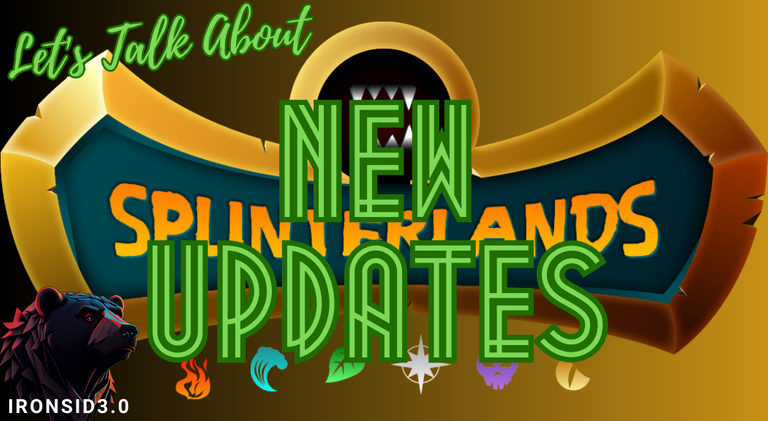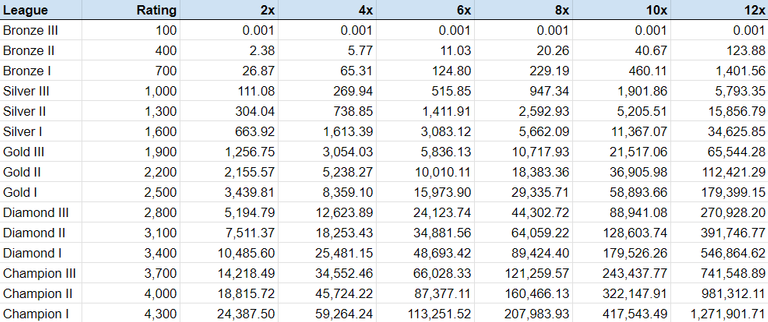
Splinterlands has recently unveiled some major changes to its ranked battle rewards and tokenomics system. While these announcements have generated excitement among players, there are also those in the community expressing concerns about the implications of these updates. Let's delve into the details and explore the different perspectives surrounding these developments!


This move is a significant step towards realizing the vision outlined in their original whitepaper. It addresses a key issue plaguing the economy and ecosystem by encouraging players to commit to the Splinterlands ecosystem in the long run. In the current setup, players could earn rewards from ranked battles without staking any SPS, leading to a negative impact on the overall economy. The new system aims to rectify this by incentivizing players to hold and potentially acquire more staked SPS.
So, what are the specifics of this new system? Let's dive in! The base amount of Reward Points earned from a ranked battle win will be determined by a formula that considers the player's rating. The higher the rating, the greater the earnings, with the rating being cubed in the formula. This means that climbing to higher leagues and tiers will become solely dependent on a player's rating, irrespective of their card collection or staked SPS.
But here's the game-changer: a new multiplier will be applied to the modified Reward Points based on the amount of staked SPS a player has. The more staked SPS they hold (or have delegated to them), the higher their multiplier will be, with a maximum multiplier of 13.3x. Even if a player has no staked or delegated SPS, they can still earn rewards with a minimum multiplier of 1x. It's important to note that players will naturally earn more SPS as they play and win battles, potentially increasing their multiplier over time.
To provide a clear understanding, the announcement includes a table showcasing the amount of staked or delegated SPS required to achieve different multipliers at various ratings. This allows players to plan and strategize accordingly, potentially investing in more SPS to enhance their rewards.
In addition to the changes in the SPS multiplier system, Splinterlands is introducing a market for renting staked SPS delegations. Players who want to receive SPS delegations can submit bids specifying the amount of staked SPS they desire and the price they're willing to pay in DEC (Splinterlands' in-game currency) per SPS per day. SPS holders can then fill these bids and receive DEC payments in return. All rentals will be for a minimum duration of 7 days, and it will be up to the SPS owner to undelegate their tokens after the rental period ends. This announcement is undoubtedly a game-changer for Splinterlands players. It aligns incentives, rewards long-term commitment, and injects new life into the economy and ecosystem, but it does not come without criticisms. One of the primary criticisms revolves around the elimination of collection power requirements. Previously, players needed to build a strong card collection to progress to higher leagues and tiers. With this change, the focus solely shifts to a player's rating, potentially disregarding the investment and effort put into acquiring powerful cards. Some members of the community fear that this could undermine the strategic aspect of the game and diminish the significance of their card collection. Another point of contention arises from the introduction of the SPS multiplier system. While the intention is to incentivize players to hold and acquire more staked SPS, critics argue that this creates a disparity between players based on their financial investment rather than their skill or gameplay prowess. The multiplier's dependence on staked SPS holdings might be seen as favoring those who can afford to invest heavily in the ecosystem, potentially creating an uneven playing field. Additionally, the new market for renting staked SPS delegations has drawn mixed reactions. Some players appreciate the flexibility it offers, allowing them to access staked SPS without having to make a long-term commitment. However, others raise concerns about potential centralization and the impact on decentralization ideals. They worry that this rental market might consolidate power in the hands of a few wealthy players, who can effectively control the distribution of staked SPS and influence the game's dynamics. Furthermore, some players have voiced their skepticism regarding the timing of these changes. Implementing such a significant overhaul mid-season has led to suggestions that the team may be making a desperation move. Critics argue that introducing such substantial changes during an ongoing season raises concerns about the impact on the competitive landscape and fairness for players who have been grinding under the previous system. This sentiment highlights the importance of considering the timing and potential disruption caused by major updates. It is evident that these changes have elicited a range of reactions within the Splinterlands community. While some players are excited about the new possibilities and rewards that lie ahead, others express reservations about the potential consequences. As with any significant shift in gameplay mechanics and tokenomics, it is natural for differing viewpoints to emerge, reflecting the complexity of a passionate and engaged player base. As the release schedule is right around the corner, only time will tell how these changes will shape the future of Splinterlands. It is an exciting yet uncertain time, as players eagerly anticipate the new ranked battle rewards and tokenomics system while the developers strive to address the community's concerns. The passion and diversity of perspectives within the Splinterlands community will undoubtedly play a significant role in shaping the direction of the game moving forward. How about you, what are your thoughts about the new update?
Src
Src

Src

Let's Talk in the Comment Section!
Let's Connect:
















